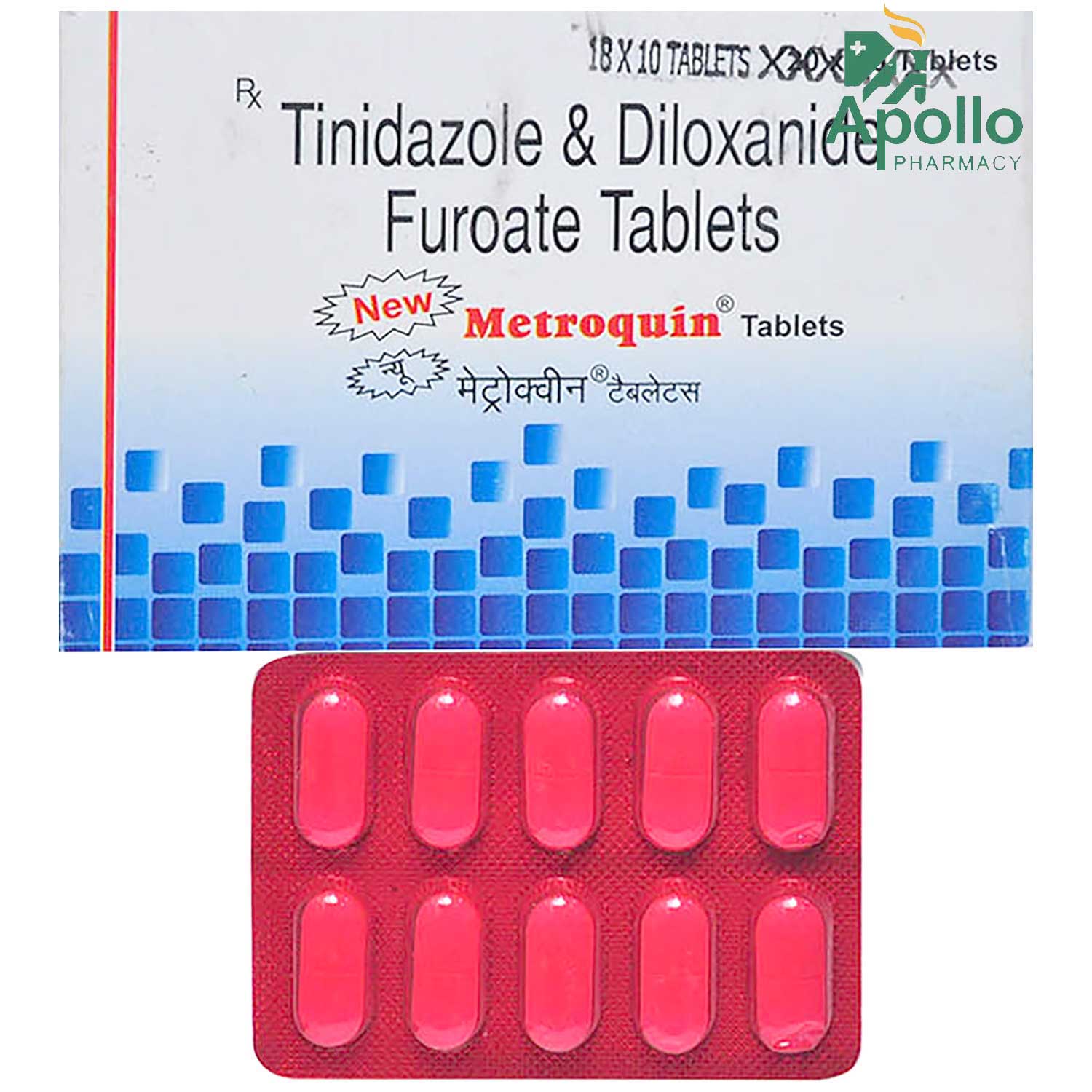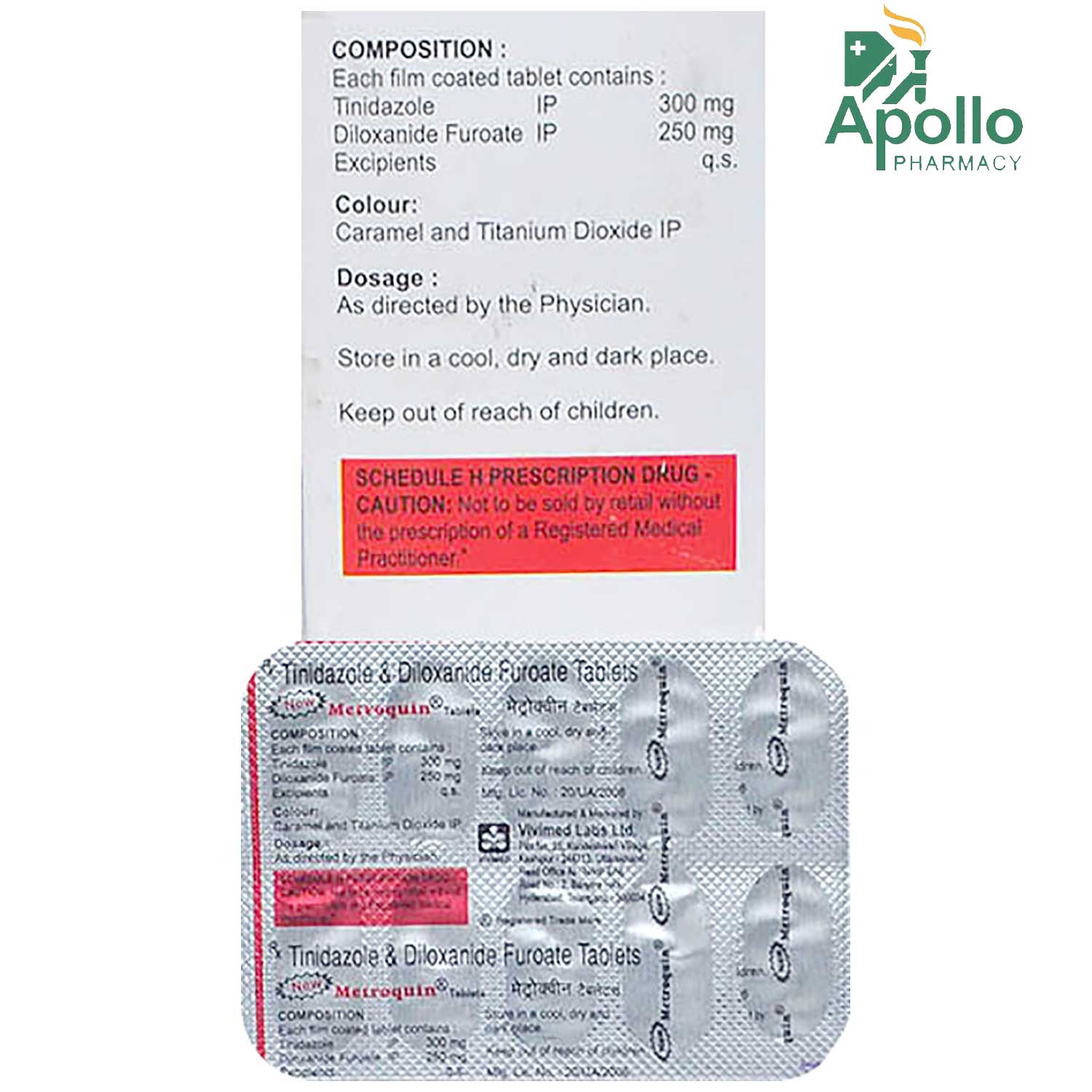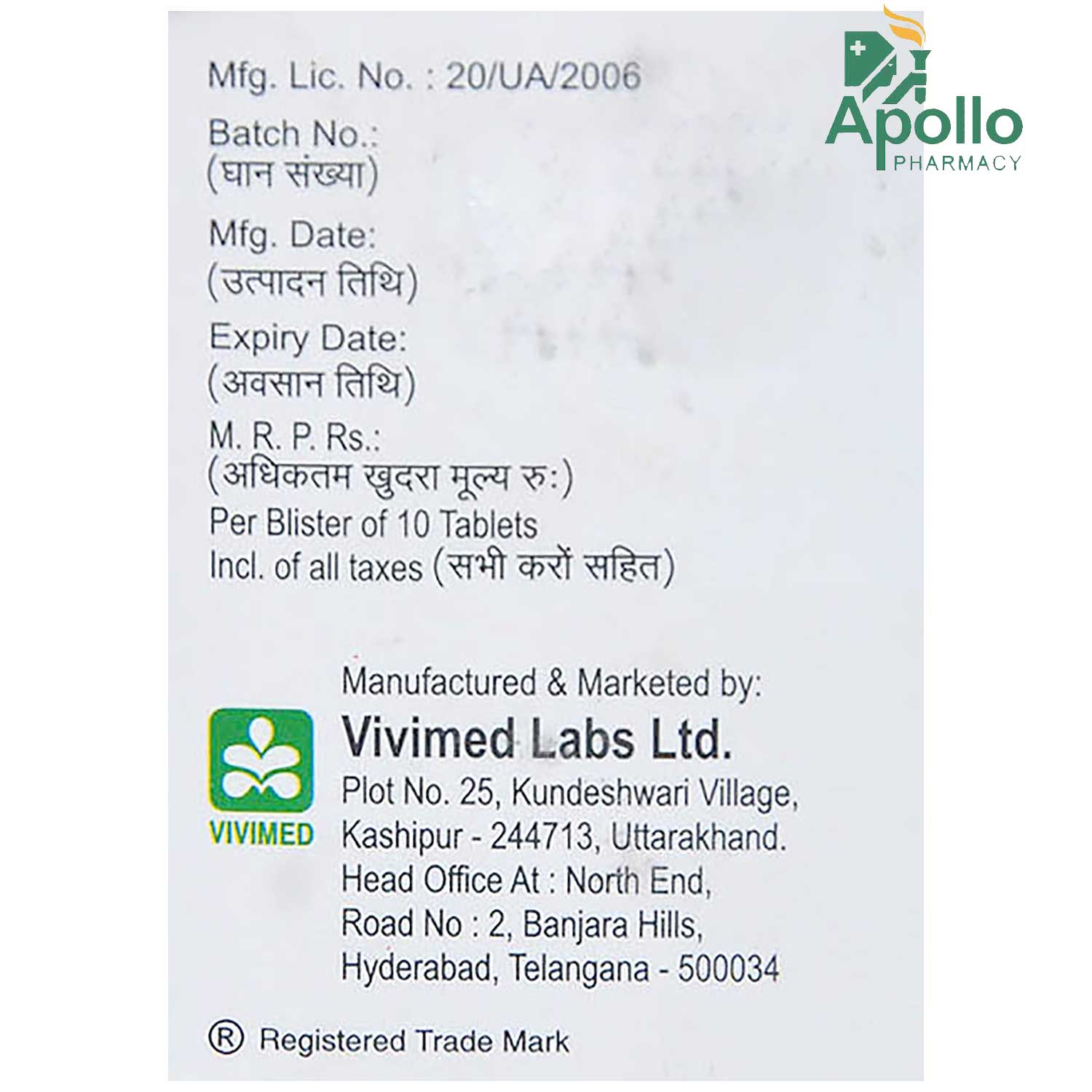METROQUINE TABLET
MRP ₹75
(Inclusive of all Taxes)
₹11.3 Cashback (15%)
Provide Delivery Location
Online payment accepted
 Prescription drug
Prescription drugWhats That
Composition :
Manufacturer/Marketer :
Consume Type :
Expires on or after :
Return Policy :
About METROQUINE TABLET
METROQUINE TABLET belongs to a class of medication called 'antiprotozoals' used to treat diarrhea and amoebic dysentery. Diarrhea is characterized by loose, watery stools or a frequent need for bowel movement. Amoebic dysentery is an infection caused by any amoebae of the Entamoeba group. It causes intestinal inflammation, primarily of the colon. It can lead to mild or severe stomach cramps and severe diarrhea with mucus or blood in the faeces.
METROQUINE TABLET is a combination of two medicines, namely: Diloxanide and Tinidazole. Diloxanide (amoebicide) works inside the large intestine to kill the infection-causing amoeba (parasites). Tinidazole (antibiotic) damages the DNA (genetic material) of bacteria and protozoa and inhibits the formation of new DNA essential for bacteria's survival. Thereby, it kills microorganisms and prevents the spread of infection.
You are advised to take METROQUINE TABLET for as long as your doctor has prescribed it based on your medical condition. Swallow it as a whole with a glass of water. Do not chew, crush or break it. METROQUINE TABLET is to be taken with food. You may experience common side effects like nausea, headache, dryness in the mouth, metallic taste, and flatulence in some cases. Most of these side effects of METROQUINE TABLET do not require medical attention and gradually resolve over time. However, if the side effects persist or worsen, please consult your doctor.
If you are allergic to METROQUINE TABLET or any other medicines, please tell your doctor. Avoid taking METROQUINE TABLET and consult a doctor before taking METROQUINE TABLET, if you are pregnant or breastfeeding as it may harm the baby. METROQUINE TABLET should be used with caution in kidney diseases, liver diseases, peripheral neuropathy, epilepsy, blood disorders, G-6 phosphate dehydrogenase deficiency, and sexually transmitted diseases.
Uses of METROQUINE TABLET
Directions for Use
Key Benefits
METROQUINE TABLET is a combination of two medicines, namely: Diloxanide and Tinidazole belong to a class of medication called 'antiprotozoals' used to treat diarrhea and amoebic dysentery. Diloxanide (amoebicide) works inside the large intestine to kill the infection-causing amoeba (parasites). Tinidazole (antibiotic) works by damaging the DNA (genetic material) of bacteria and protozoa and inhibits the formation of new DNA essential for bacteria's survival. Thereby, it kills micro-organisms and prevents the spread of infection. METROQUINE TABLET is also used in the treatment of giardiasis (infection in your small intestine), trichomoniasis (a common sexually transmitted infection caused by a parasite), and appendicitis (inflammation of the appendix).
Storage
- Inform your doctor about dizziness symptoms. They may adjust your medication regimen or prescribe additional medications to manage symptoms.
- Follow your doctor's instructions for taking medication, and take it at the same time every day to minimize dizziness.
- When standing up, do so slowly and carefully to avoid sudden dizziness.
- Avoid making sudden movements, such as turning or bending quickly, which can exacerbate dizziness.
- Drink plenty of water throughout the day to stay hydrated and help alleviate dizziness symptoms.
- If you're feeling dizzy, sit or lie down and rest until the dizziness passes.
- Track when dizziness occurs and any factors that may trigger it, and share this information with your doctor to help manage symptoms.
- Inform Your Doctor: Notify your doctor immediately about your diarrhoea symptoms. This allows them to adjust your medication or provide guidance on managing side effects.
- Stay Hydrated: Drink plenty of fluids to replace lost water and electrolytes. Choose water, clear broth, and electrolyte-rich drinks. Avoid carbonated or caffeinated beverages to effectively rehydrate your body.
- Follow a Bland Diet: Eat easy-to-digest foods to help firm up your stool and settle your stomach. Try incorporating bananas, rice, applesauce, toast, plain crackers, and boiled vegetables into your diet.
- Avoid Trigger Foods: Steer clear of foods that can worsen diarrhoea, such as spicy, fatty, or greasy foods, high-fibre foods, and dairy products (especially if you're lactose intolerant).
- Practice Good Hygiene: Maintain good hygiene to prevent the spread of infection. To stay healthy, wash your hands frequently, clean and disinfect surfaces regularly, and avoid exchanging personal belongings with others.
- Take Anti-Diarrheal Medications: If your doctor advises, anti-diarrheal medications such as loperamide might help manage diarrhoea symptoms. Always follow your doctor's directions.
- Keep track of your diarrhoea symptoms. If they don't get better or worse or are accompanied by severe stomach pain, blood, or dehydration signs (like extreme thirst or dark urine), seek medical help.
- Inform your doctor about the medication you're taking and the UTI symptoms you're experiencing.
- Your doctor may adjust your medication regimen or consider alternative medications or dosages that may reduce the risk of UTIs.
- Drink plenty of water (at least 8-10 glasses a day) to help flush out bacteria. Avoid sugary drinks and caffeine, which can exacerbate UTI symptoms.
- Urinate when you feel the need rather than holding it in. This can help prevent bacterial growth and reduce the risk of UTIs.
- Consider cranberry supplements: Cranberry supplements may help prevent UTIs by preventing bacterial adhesion.
- Monitor UTI symptoms and report any changes to your doctor.
- If antibiotics are prescribed, take them as directed and complete the full course.
- Talk to your doctor to know the cause, severity and appropriate treatment options.
- Try pain relievers like ibuprofen or naproxen to relieve mild pelvic pain.
- Consider pelvic floor exercises as it helps to strengthen muscles in the pelvic region and relieve pain.
- Try relaxation techniques like deep breathing, meditation or gentle stretching.
- Drink water or other clear fluids.
- To prevent worsening of pain, limit intake of tea, coffee, or alcohol.
- Include bland foods like rice, toast, crackers, and rice in your diet.
- Avoid lying down immediately after eating as it may cause indigestion or heartburn.
- Avoid acidic and spicy food as it may cause indigestion.
Drug Warnings
If you are allergic to METROQUINE TABLET or any other medicines, please tell your doctor. Avoid taking METROQUINE TABLET and consult a doctor before taking METROQUINE TABLET, if you are pregnant or breastfeeding as it may harm the baby. METROQUINE TABLET should be used with caution in kidney diseases, liver diseases, peripheral neuropathy, epilepsy, blood disorders, G-6 phosphate dehydrogenase deficiency, and sexually transmitted diseases. METROQUINE TABLET with alcohol may cause symptoms such as flushing, increased heartbeat, nausea, thirst, chest pain and low blood pressure. So please consult your doctor before taking METROQUINE TABLET.
Drug-Drug Interactions
Drug-Drug Interactions
Login/Sign Up
Co-administration of Amprenavir and Metroquine Tablet can increase the risk or severity of developing serious side effects.
How to manage the interaction:
Co-administration of Amprenavir and Metroquine Tablet is generally avoided, as it can possibly result in an interaction, but it can be taken if your doctor has advised it. However, if you experience any symptoms like flushing, severe headache, difficulty breathing, nausea, vomiting, sweating, thirst, chest pain, rapid heartbeat, palpitation, excessive sweating, dizziness, lightheadedness, blurred vision, or confusion. Rarely, more severe reactions may include unconsciousness or convulsions, contact your doctor immediately. Do not discontinue any medications without consulting your doctor.
Drug-Food Interactions
Drug-Food Interactions
Login/Sign Up
Diet & Lifestyle Advise
- Antibiotics can alter the useful bacteria in the stomach, which leads to indigestion. Therefore, you are advised to take foods rich in probiotics, such as yoghurt/curd, kefir, sauerkraut, tempeh, kimchi, miso, kombucha, buttermilk, natto and cheese.
- Eat fibre-rich food like whole grains, beans, lentils, berries, broccoli, peas and bananas.
- Avoid foods rich in calcium, grapefruit and grapefruit juice, as they might hinder the absorption of antibiotics.
- Avoid the consumption of alcohol to treat your condition effectively.
- Avoid using tobacco.
- To cure your condition effectually, complete the full course of METROQUINE TABLET even though you find symptomatic relief.
Side Effects of METROQUINE TABLET
- Nausea
- Vomiting
- Diarrhoea
- Loss of appetite
- Stomach pain or cramps
- Headache
- Dizziness
- Dryness in mouth
- Metallic taste
- Flatulence
- Constipation
Habit Forming
Therapeutic Class
All Substitutes & Brand Comparisons
RX
Out of StockTinco 250mg/300mg Tablet
₹13.05
(₹1.17 per unit)
82% CHEAPERRX
Out of StockTinifur 250mg/300mg Tablet
₹13
(₹1.17 per unit)
82% CHEAPERRX
Out of StockNidalox 250mg/300mg Tablet
₹15.4
(₹1.39 per unit)
79% CHEAPER
Drug-Diseases Interactions
Drug-Diseases Interactions
Login/Sign Up
FAQs
Drug-Drug Interactions Checker List
- DISULFIRAM
- ALCOHOL
- COTRIMOXAZOLE
- ITRACONAZOLE
- VORICONAZOLE
- KETOCONAZOLE
- AMPICILLIN
- DOXYCYCLINE
- DILITAZEM
- VERAMAPIL
- AMPRENAVIR
Special Advise
- It is advisable to stay hydrated and drink plenty of water to overcome medicine side effects.
- Do not skip doses and finish the prescribed course, even if you start to feel better. Stopping it early may increase your risk of further infection.
- Do not drink alcohol during or for 2-3 days after treatment with this medicine. You may develop nausea, vomiting, flushing and headache.
Disease/Condition Glossary
Amoebic dysentery (amoebiasis): Amebiasis is an intestinal (bowel) illness caused by a microscopic (tiny) parasite called Entamoeba histolytica, which is spread through human faeces (poop). Often there are no symptoms, but sometimes it causes diarrhea (loose stool/poop), nausea (a feeling of sickness in the stomach) and weight loss.
Diarrhea: Diarrhea is characterized by loose, watery stools or a frequent need for bowel movement. It usually lasts a few days and often disappears without any treatment. Symptoms include nausea, abdominal pain, cramping, bloating, and dehydration.
Giardiasis: Giardiasis is an infection in your small intestine. It’s caused by a microscopic parasite called Giardia lamblia. Giardiasis spreads through contact with infected people. And you can get giardiasis by eating contaminated food or drinking contaminated water. Symptoms include fatigue, nausea, diarrhea.

Have a query?
Alcohol
Safe if prescribed
Consuming alcohol while taking METROQUINE TABLET may cause symptoms such as flushing, increased heartbeat, nausea, thirst, chest pain and low blood pressure. So please consult your doctor before taking METROQUINE TABLET.
Pregnancy
Consult your doctor
METROQUINE TABLET may be unsafe to use during pregnancy. Please consult your doctor before taking METROQUINE TABLET if you are pregnant. Your doctor will weigh the benefits and any potential risks before prescribing it.
Breast Feeding
Consult your doctor
METROQUINE TABLET may be unsafe to use during breastfeeding. Please consult your doctor before taking METROQUINE TABLET if you are breastfeeding. Your doctor will weigh the benefits and any potential risks before prescribing it.
Driving
Safe if prescribed
METROQUINE TABLET should be used with caution in driving. It may cause drowsiness or dizziness; please do not drive a car or operate machinery while taking METROQUINE TABLET if you experience such side effects.
Liver
Consult your doctor
METROQUINE TABLET should be used with caution in liver disease. Please inform your doctor before taking METROQUINE TABLET if you have liver impairment.
Kidney
Consult your doctor
METROQUINE TABLET should be used with caution in kidney disease. Please inform your doctor before taking METROQUINE TABLET if you have kidney impairment.
Children
Safe if prescribed
METROQUINE TABLET should be taken as advised by your doctor. Because dose adjustment is made according to age, weight and severity of the infection by your doctor.










